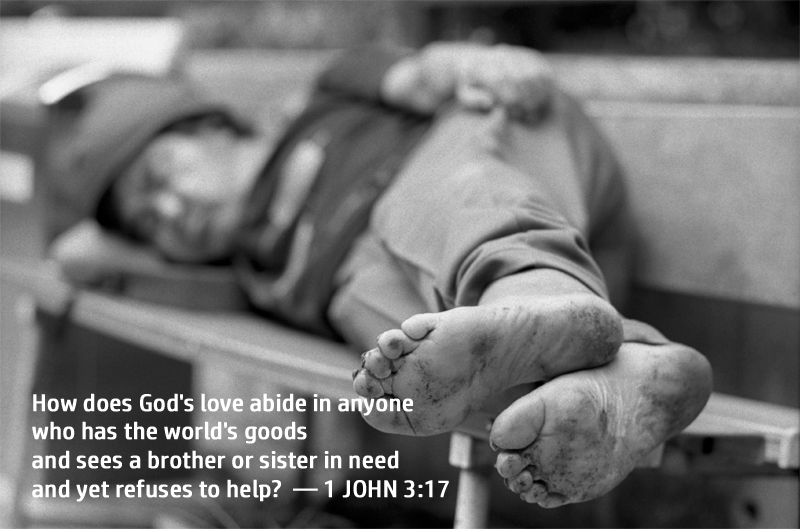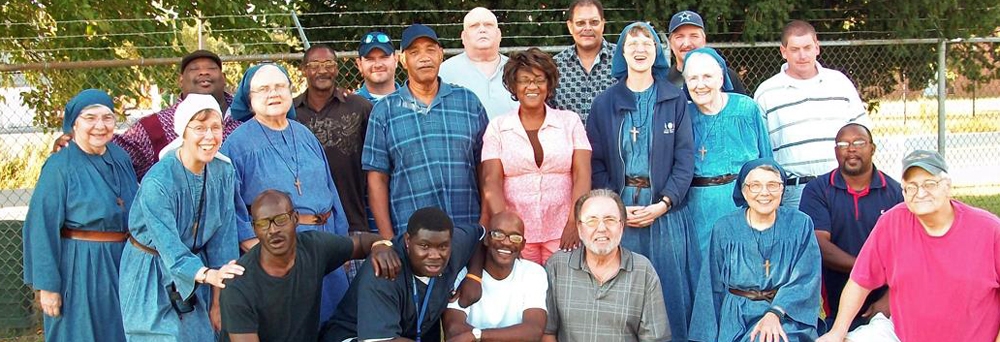Newsletter: September 2017

Dear Friends of Joseph House:
A prison can keep someone locked in, and also locked out.
In Upton Sinclair’s novel The Jungle, the protagonist, Jurgis Rudkus, finds himself homeless, destitute, and ravenously hungry. He staggers up and down the city streets looking for work, fighting hunger-induced fatigue. His struggle is to no avail: he is a prisoner, trapped in a type of reverse prison. As Sinclair explains,
“Everywhere he went, from one end of the vast city to the other, there were hundreds of others like him; everywhere was the sight of plenty — and the merciless hand of authority waving them away. There is one kind of prison where the man is behind bars, and everything that he desires is outside; and there is another kind where the things are behind the bars, and the man is outside.”
Excluded from society, not welcome anywhere, Rudkus is confined to the forgotten shadows. It’s easy for us to keep the poor and homeless locked in this sort of prison. We go about our lives, preoccupied with our own concerns, never seeing the poor because we avoid them. Mentally, if not physically, we shut them out from the world in which we choose to live.
Each of us has a key to this prison. The first door to unlock is the one leading to the heart. After that, we need to take a look at how we live. Ask God for help: He will open our eyes and opportunities to love the poor will present themselves. The doors we kept locked — out of fear? ignorance? prejudice? — will be in our power to open.
As a friend of the Joseph House, you already have an active concern for the well-being of people in need. With your support, we welcome the poor as our brothers and sisters and share with them the essential goods they are lacking. The Joseph House Crisis Center helps numerous families every week with food, rent, utility bills, and the like.
The Joseph House Workshop, which opened 12 years ago this month, provides personalized and in-depth assistance for up to eight homeless men at a time. The goal is to help these men learn the skills they need to find gainful employment and live independently. We’re not ones to toot our own horn, but the Workshop is doing a great job.
For homeless men, the Joseph House Workshop is an open door to a new life. It maintains a healthy, substance-free environment and is staffed 24 hours a day. Residents can live there for as long as two years (click here for more details about the program). Here is a report from the Workshop Director, Dr. Art Marsh, and the Resident Program Manager, Mr. Rudy Drummond:
We currently have all are beds filled or committed to be filled. We have seven residents housed at this point. One resident is in the most senior phase of the program, which requires considerable achievement. Four of our residents are about to begin Phase 2 (seeking employment). We currently have two residents about to enter Phase 1. We are awaiting another resident coming to us from Eastern Correctional Institution, who we anticipate will be joining us the end of this month.
One of our recent graduates, who enrolled in the Armed Services, will be returning to us for a brief visit before shipping out to his assigned station in South Korea. Several of our other successful graduates visit the Workshop periodically to confirm their on-going successes.
The Workshop is in need of volunteers to teach various aspects of Phase 1 life skill topics. The commitment would be for a one hour time period one to two days a week in the afternoon. It is our pleasure to note that all the successful residents, past and present, manifest a continued deep appreciation for all that the Workshop and the Little Sisters have given them.
God’s blessing has nurtured this ministry from the beginning. We’ve been told that the Workshop has quietly garnered an excellent reputation around town. This is due to the dedication and quality service supplied by the staff. You’re also key to the success: your generosity alone keeps the Workshop afloat. Thank you!

Your generosity also makes the Crisis Center a refuge for people in need.
Tracey, 34, has three children and was working two jobs, but then she relapsed into alcoholism. She said stress was the reason she started drinking again. Tracey found a better reason for stopping — her family — and has been sober for six months. She is trying to repair the damage that was done, and that includes getting the electricity turned back on in her home. The Joseph House paid $200 toward Tracey’s delinquent electric bill.
Howard, 59, is also trying to reclaim his life from alcoholism. He had his last drink a month ago while he was still homeless. Howard found a place to stay in a halfway house, but to continue living there he must pay rent. We agreed to send over $200. Howard opened up to one of our volunteers and talked about his childhood abuse and his current struggles with anxiety and depression.
Laura, 51, is a simple and humble woman. She lives alone and recently lost her job working in a restaurant kitchen. Her new job will be in a fast-food establishment. In the past month Laura earned $600. She paid some of her essential bills and was short on the $400 rent. We paid $200 to her landlord to stop the eviction.
When we die, we all hope St. Peter will open the Pearly Gates for us. How wonderful that will be, to be welcomed into God’s house, where there are many dwelling places and one prepared for each of us (John 14:2). Our exile will be at an end. In the meantime, let’s do what we can to help people who feel left out today.
As always, we hold you in our hearts each day in prayer. May you be blessed with happiness and peace.
Your Little Sisters of Jesus and Mary
